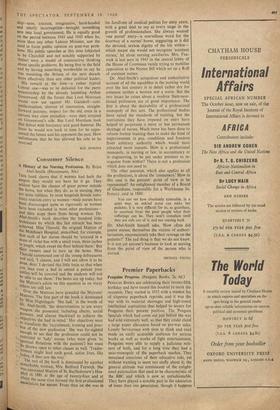Consumer Silence
A History of the Nursing Profession. By Brian Abel-Smith. (Heinemann, 30s.)
THIS book shows that if women had built the empire they would not have let it go. They
seldom have the chance of great power outside
the home, but when they do, as in nursing, they are quite ruthless. In most hospitals female auto-
cracy restricts entry to women—male nurses have
been discouraged quite as rigorously as women have been excluded in most other professions—
and then stops them from being women. Dr.
Abel-Smith's book describes the hundred little techniques by , which this last miracle, has been achieved. Miss Thorold, the original Matron of the Middlesex Hospital, preicribed, for example, that each of her nurses should be 'arrayed in a dress of violet hue with a small train, three inches in, length, which swept the floor behind them.' But their owners used to turn up the hems. Miss Thorold summoned one of the young delinquents and said, '1 cannot, and I will not allow it to be done, dear. I devised this little train so that when You lean over a bed to attend a patient your ankles will be covered and the students will not be able to see them.' The hems are up today, but the Matron's edicts on this question as on many others are still law. _Over the Matrons have presided the Matrons' smatrons. The first part of the book is dominated by Miss Nightingale. 'She had,' in the words of br. Abel-Smith, 'the determination to use every weapon she possessed, including charm, social Pressure, and almost blackmail to achieve the objectives she had in mind.' Her objectives were In transform the 'recruitment, training and prac- tice of the new profession.' She was far-sighted enough to see that the profession could not be restricted to 'lady' nurses (who were given `to spiritual flirtations with the patients') but must `I3e thrown open to other classes as well. 'Trades- ivomen might lead such good, active lives, like adies, if they saw the way.'
The rest of the book is dominated by another remarkable woman, Mrs. Bedford Fenwick. She was appointed Matron of St.. Bartholomew's Hos- Pital in 1881 at the age of twenty-four and at about the same time formed the first professional association for nurses. From then on she was in the forefront of medical politics for sixty years, with a great deal to say at every stage in the growth of professionalism. She always wanted `one portal' entry—a marvellous word for the doorway of a nurses' home, suggesting as it did the devoted, sexless dignity of the life within— which meant she would not recognise 'assistant nurses,' let alone nursing auxiliaries. Mrs. Fen- wick is last seen in 1943 in the central lobby of the House of Commons vainly trying to mobilise opposition to the Nurses Bill which set up a Roll of assistant nurses.
Dr. Abel-Smith's scrupulous and authoritative account of all the squabbles in the nursing world over the last century is in detail rather dry for someone neither a woman nor a nurse. But the two issues he raises about a modern State-sanc- tioned profession are of great importance. The first is about the desirability of a professional monopoly of this sort. The professional bodies have raised the standards of training, but the restrictions they have imposed on entry have helped to perpetuate a more or less permanent shortage of nurses. Much more has been done to reform formal training than to make the kind of improvements in pay, conditions and freedom from arbitrary authority which would have attracted more recruits. How is a professional monopoly, in nursing or law, in accountancy or in engineering, to be put under pressure to re- organise from within? There is not a profession which does not,need to.
The other question, which also applies to all the professions, is about the 'consumers.' How in this case is the patients' point of view to be repreiented? An enlightened member of a Board of Guardians, responsible for a Workhouse In- firmary, said in 1880: You can see how absolutely miserable, in a
quiet way, an unkind nurse can make her patients; it is very difficult for us, as guardians, to ascertain from the poor people what their sufferings can be. They won't complain until they are safe out of it, and not coming back.
Dr. Abel-Smith himself asks, 'How often did junior nurses, themselves the victims of authori- tarianism, unconsciously take their revenge on the patients?' The sad thing is that we do not know. 16 is not yet anyone's business to look at nursing from the point of view of the person who is nursed.
MICHAEL YOUNG










































 Previous page
Previous page